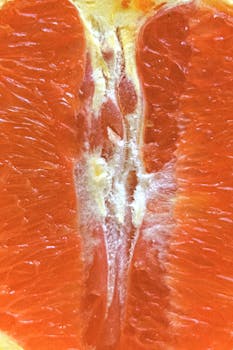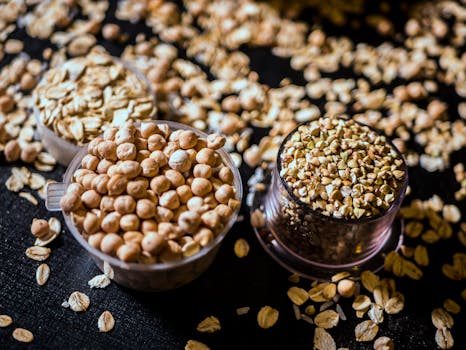Indice
- Understanding the Importance of a Healthy Diet
- Top Nutrient-Dense Fruits and Their Benefits
- Powerhouse Vegetables for Optimal Health
- Whole Grains: The Foundation of a Balanced Diet
- Lean Proteins: Building Blocks for Your Body
- Healthy Fats: Essential for Brain and Heart Health
- Superfoods: Nutrient Powerhouses You Should Know
- Healing Herbs and Spices: Nature’s Medicine Cabinet
- Nutritious Beverages: Hydration with Added Benefits
- Fermented Foods: Boosting Gut Health and Immunity
- Nuts and Seeds: Small Packages, Big Nutrition
- Seafood: Omega-3 Rich Options for Heart and Brain
- Incorporating the Healthiest Foods into Your Daily Diet
Understanding the Importance of a Healthy Diet

The Foundation of Physical Health
A healthy diet forms the cornerstone of good physical health. It provides the necessary nutrients, vitamins, and minerals that our bodies need to function optimally. Consuming a balanced diet rich in fruits, vegetables, whole grains, and lean proteins can help prevent chronic diseases, improve immune function, and support overall well-being. The foods we choose not only influence our weight but also our energy levels, mood, and mental clarity.
Mental Well-being and Nutrition
There is a strong link between nutrition and mental health. Certain foods, particularly those high in omega-3 fatty acids, antioxidants, and vitamins, have been shown to enhance brain function and improve mood. For instance, foods like fatty fish, berries, and leafy greens can help reduce symptoms of depression and anxiety. A well-nourished brain is essential for cognitive function, making a healthy diet vital for maintaining mental sharpness and emotional stability.
Long-term Health and Longevity
Adopting a healthy diet can lead to a longer, healthier life. Research has consistently shown that diets rich in whole foods are associated with a lower risk of diseases like diabetes, heart disease, and certain types of cancer. Incorporating a variety of nutrient-rich foods not only supports physical health but also promotes longevity. Making informed dietary choices is a proactive approach to ensuring a healthy future and enjoying a higher quality of life as we age.
Top Nutrient-Dense Fruits and Their Benefits

Blueberries: A Superfood for Brain Health
Blueberries are often hailed as a superfood due to their high levels of antioxidants, particularly anthocyanins. These compounds are known for their ability to combat oxidative stress in the body, which can help reduce the risk of age-related cognitive decline. Regular consumption of blueberries has been associated with improved memory and overall brain function, making them an excellent snack for students and professionals alike. Additionally, blueberries are low in calories and high in fiber, aiding in digestion and promoting a healthy gut.
Bananas: Nature’s Energy Boost
Bananas are an incredibly convenient and nutritious fruit, packed with essential vitamins and minerals. They are especially rich in potassium, a mineral that plays a critical role in heart health and blood pressure regulation. Moreover, bananas provide a quick source of energy, making them a popular choice for athletes and those needing a mid-day boost. The presence of vitamin B6 also supports metabolism and brain function. Their natural sweetness satisfies sugar cravings while providing a healthy dose of dietary fiber.
Oranges: Immune Support and Hydration
Oranges are famously known for their vitamin C content, which is vital for a robust immune system. This powerful antioxidant helps protect cells from damage and aids in the absorption of iron from plant-based foods. Beyond immunity, oranges are composed of about 86% water, making them an excellent choice for hydration. They are also packed with flavonoids, which have anti-inflammatory properties and may lower the risk of chronic diseases. Incorporating oranges into your diet can be as simple as a fresh snack or a refreshing addition to salads and smoothies.
Powerhouse Vegetables for Optimal Health

Spinach: Nutrient-Rich Leafy Green
Spinach is one of the most nutrient-dense vegetables available. It is packed with vitamins A, C, and K, as well as magnesium, iron, and calcium. The high antioxidant content of spinach helps to combat oxidative stress and inflammation in the body. Regular consumption of spinach has been linked to improved eye health, thanks to its lutein and zeaxanthin levels, which can protect against age-related macular degeneration. Additionally, incorporating spinach into meals is easy, whether in salads, smoothies, or cooked dishes.
Broccoli: A Cruciferous Powerhouse
Broccoli is renowned for its cancer-fighting properties and is a fantastic source of vitamins and minerals. High in vitamin C, K, and folate, broccoli supports immune function and aids in blood clotting. It contains sulforaphane, a compound studied for its potential to prevent cancer by promoting detoxification and inhibiting tumor growth. Broccoli is also rich in fiber, which promotes digestive health. Whether steamed, roasted, or added to stir-fries, broccoli is a versatile addition to any healthy diet.
Carrots: Vision-Enhancing Crunch
Carrots are famous for their bright orange hue, which comes from beta-carotene, a powerful antioxidant that the body converts into vitamin A. This essential vitamin is crucial for maintaining healthy vision, particularly in low-light conditions. Carrots also provide a good source of fiber, which supports digestive health and can aid in weight management. Additionally, their natural sweetness makes them a popular snack option for both children and adults. Enjoying carrots raw, roasted, or blended into soups can help enhance your overall nutrient intake.
Whole Grains: The Foundation of a Balanced Diet

The Nutritional Power of Whole Grains
Whole grains, such as brown rice, quinoa, oats, and whole wheat, are foundational components of a balanced diet. Unlike refined grains, whole grains retain the bran, germ, and endosperm, making them richer in nutrients. They are excellent sources of fiber, which supports digestive health by preventing constipation and aiding in regular bowel movements. Whole grains are also packed with essential vitamins and minerals, including B vitamins, iron, magnesium, and selenium. Consuming whole grains regularly can significantly improve your overall nutrient intake while providing sustained energy throughout the day.
Heart Health and Whole Grains
Incorporating whole grains into your diet can drastically improve heart health. Numerous studies have shown that individuals who consume a diet rich in whole grains have a lower risk of heart disease. The fiber found in whole grains helps lower levels of LDL cholesterol, also known as “bad” cholesterol, while promoting the production of HDL cholesterol, the “good” type. Furthermore, whole grains contribute to better blood pressure regulation and reduced inflammation, both of which are critical for maintaining cardiovascular health. Regular consumption of whole grains can therefore be a key strategy for protecting your heart.
Weight Management and Satiety
Whole grains can help with weight management due to their high fiber content, which promotes a feeling of fullness and reduces overall calorie intake. Foods rich in whole grains take longer to chew and digest, leading to prolonged satiety compared to their refined counterparts. This makes them an ideal choice for those looking to maintain or lose weight. Additionally, replacing refined grains with whole grains can support stable blood sugar levels, which helps prevent the energy crashes and cravings that often accompany sugary, processed foods. By including whole grains in your meals, you can improve your dietary quality while supporting a healthy weight.
Lean Proteins: Building Blocks for Your Body

The Importance of Lean Proteins
Lean proteins are crucial for maintaining a healthy body as they provide the essential amino acids needed for muscle repair and growth. Unlike their higher-fat counterparts, lean proteins offer a lower calorie option without sacrificing nutritional value. Foods such as chicken breast, turkey, fish, beans, and legumes are excellent sources of lean protein. Including these in your diet can support weight management by promoting satiety, helping you feel full longer. Moreover, they assist in stabilizing blood sugar levels, which is vital for avoiding energy spikes and crashes throughout the day.
Lean Proteins and Muscle Health
Incorporating lean proteins into your diet is particularly beneficial for muscle health. The amino acids found in protein are the building blocks of muscle tissue, making it essential for athletes and active individuals. Consuming adequate amounts of lean protein can enhance muscle recovery post-exercise, reducing soreness and aiding in faster rehabilitation. Additionally, proteins play a critical role in producing enzymes and hormones that regulate many bodily functions. This makes lean proteins not only important for physical strength but also vital for overall metabolic health.
Beyond muscle health, lean proteins can also contribute positively to digestive health. Consuming a diet that includes lean sources of protein can reduce the risk of diverticulitis, a condition characterized by inflammation of the digestive tract. Moreover, incorporating lean protein alongside fiber-rich foods like fruits, vegetables, and whole grains can further promote gut health by supporting regular bowel movements and a balanced microbiome. A healthy gut is a cornerstone of overall well-being, making lean proteins an essential part of a comprehensive diet strategy.
Healthy Fats: Essential for Brain and Heart Health

The Different Types of Healthy Fats
Healthy fats, often categorized into unsaturated fats, saturated fats, and trans fats, are vital for our overall health. Unsaturated fats, found in foods such as avocados, nuts, and olive oil, can help reduce bad cholesterol levels and lower the risk of heart disease. Conversely, trans fats, commonly found in processed foods, should be avoided as they can raise LDL cholesterol and lower HDL cholesterol, leading to increased health risks. Saturated fats, while once thought to be harmful, can be consumed in moderation, particularly when they come from whole food sources like coconut oil and grass-fed animal products. Understanding these distinctions allows individuals to make better dietary choices that support their cardiovascular and neurological health.
Omega-3 Fatty Acids: The Superstars of Brain Health
Omega-3 fatty acids are essential fats that play a crucial role in brain health and development. These fats are predominantly found in oily fish such as salmon, mackerel, and sardines, along with plant-based sources like flaxseeds, chia seeds, and walnuts. Research indicates that Omega-3s are vital for cognitive function, potentially aiding in memory and focus while also reducing the risk of neurodegenerative diseases like Alzheimer’s. Furthermore, they possess anti-inflammatory properties that can benefit heart health by reducing triglycerides and lowering blood pressure. Ensuring adequate intake of Omega-3 fatty acids is essential for maintaining optimal brain function and overall cardiovascular health.
Avocados: A Creamy Source of Nutrients
Avocados are an exemplary source of healthy fats, primarily monounsaturated fats, which are known to support heart health. Rich in potassium, fiber, and vitamins E, C, and K, avocados are not only nutritious but also versatile. They can be incorporated into a variety of dishes, from salads to smoothies, enhancing both flavor and nutritional profile. Moreover, the healthy fats in avocados promote satiety and can aid in nutrient absorption from other foods, making them an excellent addition to any meal. By embracing avocados as part of a balanced diet, individuals can support their heart health while enjoying deliciously creamy dishes.
Superfoods: Nutrient Powerhouses You Should Know

The Definition and Significance of Superfoods
Superfoods are nutrient-dense foods that are acclaimed for their exceptional health benefits. They are typically high in antioxidants, vitamins, and minerals while being low in calories. The term “superfood” isn’t a medical classification but has gained popularity in the nutrition community to highlight foods that can offer unique health advantages. Eating a variety of superfoods can help in fighting inflammation, boosting the immune system, and improving overall health, making them a beneficial addition to any diet.
Popular Superfoods and Their Benefits
Several foods have garnered the title of superfoods due to their impressive nutritional profiles. For instance, quinoa is celebrated not just for its protein content but also for being a complete source of essential amino acids. Similarly, chia seeds are packed with omega-3 fatty acids, fiber, and protein, making them excellent for heart health and digestion. Other notable superfoods include kale, which is rich in vitamins A, C, and K, and provides numerous antioxidants that combat oxidative stress. Incorporating these superfoods into your meals can significantly enhance your nutrient intake.
How to Incorporate Superfoods into Your Diet
Integrating superfoods into your daily meals can be both enjoyable and straightforward. Consider adding spinach or kale to smoothies for a nutrient boost without altering the flavor significantly. Quinoa can easily replace refined grains in salads and side dishes, providing a hearty texture along with essential nutrients. Snacks can also be fortified with superfoods; try sprinkling chia seeds or hemp seeds on yogurt or oatmeal. By creatively including these nutrient powerhouses in your diet, you can enhance your meals and improve your overall nutritional status.
Healing Herbs and Spices: Nature’s Medicine Cabinet

Turmeric: The Golden Spice
Turmeric, often referred to as the “golden spice,” is renowned for its anti-inflammatory properties due to its active compound, curcumin. Regular consumption of turmeric can help alleviate symptoms of arthritis, improve joint health, and enhance overall well-being. Beyond inflammation, turmeric is also recognized for its antioxidant qualities, which protect the body from oxidative stress and can potentially lower the risk of chronic diseases. Adding turmeric to dishes not only enhances flavor but also provides a myriad of health benefits that contribute to a balanced diet.
Garlic: A Potent Health Booster
Garlic has been celebrated for centuries for its medicinal properties, making it a vital staple in many cultures. Rich in sulfur compounds, particularly allicin, garlic exhibits strong antimicrobial and anti-inflammatory effects. Research suggests that regular consumption of garlic can boost the immune system, lower blood pressure, and reduce cholesterol levels. Moreover, garlic is known for its potential cancer-fighting properties. Incorporating raw or cooked garlic into meals not only enhances flavor but also contributes to significant health benefits, making it a remarkable addition to a healthy diet.
Ginger: Nature’s Digestive Aid
Ginger is a well-known herb with a long history of use in traditional medicine, particularly for its digestive benefits. The active compounds in ginger, such as gingerol, have been shown to reduce nausea, particularly in pregnant women and individuals undergoing chemotherapy. Additionally, ginger possesses anti-inflammatory and antioxidant properties that can promote overall health. Using fresh ginger in teas, salads, and various dishes can not only add a zesty kick but also support digestive health and mitigate symptoms of gastrointestinal discomfort.
Cinnamon: The Sweet Spice with Benefits
Cinnamon is not just a flavorful addition to desserts and beverages; it is also packed with health benefits. This aromatic spice has been linked to improved insulin sensitivity and reduced blood sugar levels, making it a valuable ally for individuals with diabetes. Additionally, cinnamon is rich in antioxidants and anti-inflammatory properties, which contribute to overall health. Whether sprinkled on oatmeal, added to smoothies, or used in baked goods, cinnamon can enhance both the flavor and nutritional value of meals, providing a sweet way to boost health.
Nutritious Beverages: Hydration with Added Benefits

Green Smoothies: A Nutrient Powerhouse
Green smoothies have gained popularity for their ability to deliver a wealth of nutrients in a single, delicious serving. Typically made from a blend of leafy greens like spinach or kale, along with fruits such as bananas and berries, they provide a balance of vitamins, minerals, and antioxidants. The high fiber content from fruits and greens aids digestion and promotes satiety, making them excellent for weight management. Adding ingredients like chia seeds or flaxseeds can further boost omega-3 fatty acid content, enhancing the smoothie’s health benefits. Enjoying a green smoothie in the morning can set a nutritious tone for the day.
Herbal Teas: Calming and Healing
Herbal teas are not only comforting but also packed with health benefits. Varieties such as chamomile, peppermint, and ginger tea offer unique properties that can aid digestion, soothe anxiety, and bolster the immune system. For instance, chamomile is renowned for its calming effects, making it an excellent choice for winding down at night, while ginger tea may alleviate nausea and improve stomach health. Herbal teas can be a caffeine-free alternative to traditional beverages, providing hydration along with various health benefits without the added sugars or calories commonly found in commercial drinks.
Infused Water: Flavor without Guilt
Infused water is an excellent way to make hydration more enjoyable while adding essential nutrients. By adding slices of fruits like lemon, berries, or cucumbers, individuals can create refreshing beverages that enhance their water intake without the calories and sugars found in sodas or commercial juices. These infusions typically provide vitamins and antioxidants, improving skin health and digestion. Infused water can be a delightful alternative to sugary drinks and encourages individuals to meet their daily hydration needs, making healthy living both tasty and effortless.
Coconut Water: Nature’s Electrolyte Drink
Coconut water is often referred to as a natural electrolyte drink, making it an excellent choice for hydration post-exercise. Rich in potassium, magnesium, and calcium, coconut water helps replenish electrolytes lost during physical activity, making it a favorite among athletes. Its naturally sweet flavor is a healthier alternative to sports drinks, which often contain added sugars and artificial flavors. In addition to hydration, the nutrients in coconut water can support heart health and overall hydration status, positioning it as a beneficial beverage option for those looking to maintain an active lifestyle.
Fermented Foods: Boosting Gut Health and Immunity

The Gut Microbiome and Health
Fermented foods play a vital role in promoting a healthy gut microbiome, which is crucial for overall health. The fermentation process introduces beneficial bacteria, known as probiotics, into foods such as yogurt, kimchi, sauerkraut, and kefir. These probiotics help to maintain and restore the natural balance of gut bacteria, enhancing digestive health and boosting the immune system. A well-balanced microbiome is essential for efficient digestion, nutrient absorption, and even mental health, as studies have shown a strong connection between gut health and mood regulation.
Immune System Support
Incorporating fermented foods into your diet can significantly enhance your immune response. Probiotics found in these foods have been shown to increase the production of antibodies and stimulate the activity of immune cells, making the body more resilient to infections. Moreover, fermented foods can help reduce inflammation in the body, a common factor in various diseases. For example, regular consumption of fermented yogurt has been linked to lower respiratory tract infections, highlighting the importance of gut health in overall immunity.
Simple Ways to Include Fermented Foods
Incorporating fermented foods into your daily diet is straightforward and can enhance both flavor and nutrition. Start your day with a serving of probiotic-rich yogurt topped with fruits or nuts. Add sauerkraut or kimchi as a tangy side dish to your meals, or enjoy their complex flavors in salads and bowls. Kombucha, a fermented tea, serves as a refreshing beverage option, while miso soup can provide a warm and nutritious start to any meal. By making small changes to include these foods, you can improve your gut health and overall well-being.
Nuts and Seeds: Small Packages, Big Nutrition

Nutritional Powerhouses
Nuts and seeds are among the most nutrient-dense foods on the planet, providing a wealth of essential nutrients in a small, convenient package. Rich in healthy fats, proteins, vitamins, and minerals, they contribute significantly to heart health, weight management, and overall nutritional intake. For instance, nuts like almonds and walnuts are high in omega-3 fatty acids, which are critical for brain health and reducing inflammation. Meanwhile, seeds such as chia and flaxseed are excellent sources of dietary fiber, helping to maintain digestive health while also promoting feelings of fullness.
Heart Health Benefits
Regular consumption of nuts and seeds has been linked to improved heart health. Studies have shown that diets rich in these foods can lower bad cholesterol levels, reduce blood pressure, and promote optimal blood circulation. The monounsaturated and polyunsaturated fats found in nuts, such as those in walnuts and hazelnuts, help decrease the risk of heart disease significantly. Additionally, the potassium and magnesium content in seeds like pumpkin and sunflower seeds can aid in maintaining healthy blood pressure levels, making these tiny superfoods a heart-healthy choice.
Incorporating Nuts and Seeds into Your Diet
Integrating nuts and seeds into your daily meals is simple and can enhance both taste and nutrition. Start your day by adding a handful of nuts to your morning oatmeal or smoothie for added crunch and protein. Seeds can be sprinkled on salads, yogurt, or used in baking to boost nutritional content. Nut butters, such as almond or peanut butter, are excellent spreads for whole-grain toast or can be added to smoothies for a creamy texture. The versatility of nuts and seeds makes them easy to incorporate, supporting a balanced diet and overall health effortlessly.
Seafood: Omega-3 Rich Options for Heart and Brain

The Benefits of Omega-3 Fatty Acids
Seafood, especially fatty fish like salmon, mackerel, and sardines, is renowned for its high content of omega-3 fatty acids. These essential fats are crucial for maintaining heart health as they help reduce inflammation, lower triglycerides, and can even decrease the risk of heart disease. Omega-3 fatty acids also play a vital role in brain health, enhancing cognitive function, memory, and potentially lowering the risk of neurodegenerative diseases. Including fatty fish in your diet a couple of times a week can significantly contribute to overall cardiovascular and cognitive well-being.
Choosing Sustainable Seafood
When incorporating seafood into your diet, it’s important to consider sustainability. Overfishing and unsustainable fishing practices can threaten marine ecosystems. Choosing seafood certified by organizations such as the Marine Stewardship Council (MSC) ensures that you are supporting sustainable practices. Options like sustainably sourced salmon or farmed shellfish can provide the health benefits of seafood without contributing to environmental degradation. Additionally, being informed about local seafood sources and seasonal availability can help you make better choices for both your health and the planet.
Versatile Ways to Prepare Seafood
Seafood is incredibly versatile and can be prepared in numerous delicious ways, making it an easy addition to various meals. Grilling, baking, or steaming fish preserve its nutrients while adding flavor. You can also incorporate seafood into salads, pastas, and stir-fries for a hearty and nutritious meal. For example, a spinach salad topped with grilled salmon and a lemon vinaigrette not only provides a powerful dose of omega-3s but also complements the nutrients found in leafy greens. By experimenting with different preparation methods, you can enjoy the unique flavors and health benefits seafood has to offer.
Incorporating the Healthiest Foods into Your Daily Diet

Meal Planning for Success
Incorporating the healthiest foods into your daily diet starts with thoughtful meal planning. Take time each week to create a menu that highlights nutrient-dense options such as fruits, vegetables, whole grains, lean proteins, and healthy fats. Planning meals in advance not only aids in ensuring balanced nutrition but also helps with grocery shopping, reducing impulse buys of less healthy options. Preparing meals in batches, along with having healthy snacks readily available, can simplify your daily routine and make it easier to prioritize healthy eating.
Gradual Changes Yield Lasting Results
It’s important to remember that making dietary changes doesn’t have to happen overnight. Start by gradually integrating healthier foods into your diet rather than overhauling your entire meal plan at once. For instance, aim to incorporate one new fruit or vegetable each week, or switch from refined grains to whole grains with one meal. These incremental adjustments make it easier to adopt new eating habits that can be sustained in the long run. Celebrate small victories and gradually expand your repertoire of healthy foods to create a diverse and enjoyable diet that aligns with your wellness goals.
Creating a Balanced Plate
A helpful approach to ensure you’re incorporating the healthiest foods into your meals is to follow the concept of a balanced plate. Aim to fill half your plate with colorful vegetables and fruits, one-quarter with lean protein sources, and one-quarter with whole grains. This visual guideline can help you easily assess the nutritional quality of your meals. Additionally, consider incorporating healthy fats, such as avocado or olive oil, to enhance the flavor and nutritional value of your dishes. By consciously constructing a balanced plate, you’re more likely to meet your dietary needs while enjoying a variety of flavors and textures.




